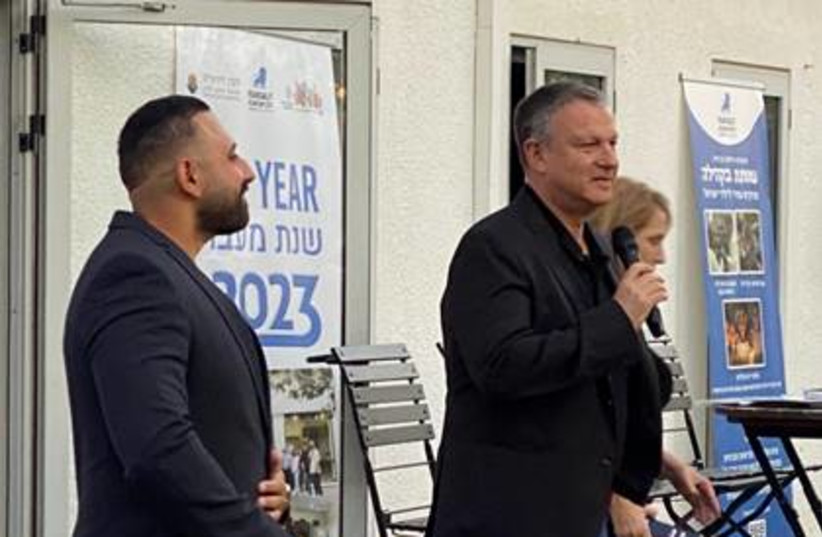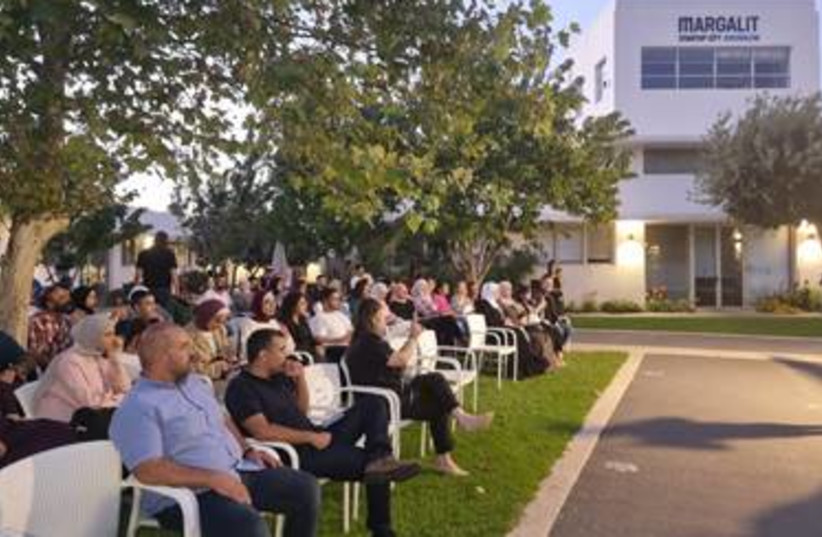Israeli Finance Minister Bezalel Smotrich is drawing sharp condemnation for freezing public funds earmarked for Arabs with Israeli citizenship. One of his strongest critics is Jewish business mogul and former left-of-center parliamentarian, Erel Margalit
In an open letter to Smotrich, Margalit called the freeze a “narrow-minded, arrogant, patronizing and thinly veiled insult” that seeks to “denigrate and undermine the dignity of east Jerusalem residents and Arab authorities.”
“Jewish and Arab communities must work together.”
Erel Margalit, BaKehila
At the same time, a new educational program run by one of Margalit’s ventures attempts to exemplify the benefits of investing in Israel’s Arab citizens and permanent residents, who comprise 20% of the country’s population.
In the courtyard of Margalit Startup City, a tech hub run by Jerusalem Venture Partners, Palestinian families from Israel and east Jerusalem gathered to celebrate the culmination of the first “BaKehila Gap Year” program designed to help young Arabs advance in Israeli higher education and business.
“BaKehila” (Hebrew for “in the community”) provides Hebrew and Arabic education, along with assistance in math, after-school tutoring, and more, to Jewish and Arab Israelis aged eight and over. The organizers say over 55,000 children have participated in BaKehila since its founding nearly 20 years ago.

BaKehila’s private funding is typically matched by the government via budgets such as those recently frozen by Finance Minister Smotrich.
The Gap Year program, a new offshoot of BaKehila, started its first cohort in January 2023 with 21 East Jerusalem participants aged 18 to 21. It focuses on Hebrew language instruction, math, business, and other subjects to foster social mobility and integration into Israeli universities and the economy.
Margalit told The Media Line that BaKehila offers one-on-one training and access to Israel’s high-tech, food tech, cybersecurity, and startup industries. It inspires young Arab adults to join innovation efforts in Israel, lead their communities, enter university, and work alongside their Jewish neighbors.
The program demonstrates “that civil societies and civil leaders can bring the two communities together,” offering “a way forward which is a win-win for both the Israeli and Palestinian communities and Jerusalem.”
BaKehila Gap Year manager Muhamad Nijam told The Media Line that 16 of the new program’s graduates have enrolled in bachelor’s degrees in Israeli universities. At the same time, the other five started small businesses.
Nijam said that high school graduates in East Jerusalem are often not ready for university. One of the biggest challenges is insufficient Hebrew fluency, particularly in east Jerusalem, where most Arabs hold permanent residency cards, not citizenship, and identify politically as Palestinian.
“Unfortunately, our education doesn’t concentrate on” Hebrew, said Ramsi Ibrahim, an EMT and volunteer Hebrew teacher in the BaKehila program. When east Jerusalem students finish high school, he says, they discover how challenging that lack of fluency can be. Without Hebrew, they find it difficult to perform ordinary tasks such as using public transportation and shopping in supermarkets.
Often, Ibrahim says, Arabs and Jews in Israel are simply unable to communicate with one another. Both Jewish and Arab schools are to blame, he says, as neither does a good job of instructing students in the other community’s language.
Margalit believes that when people work, study, and create companies together, they create an atmosphere of peaceful coexistence “greater than anything the current government can imagine.” It is possible to find ways of working together, he says, “whether you’re from the [political] left, right, or center.”
If Israel is to have an optimistic future, Margalit says, “Jewish and Arab communities must work together.”
Smotrich refused to transfer funds intended for east Jerusalem Arabs
Smotrich’s policies triggered public criticism in July when the finance minister, who is a member of an extreme right-wing party, announced that he intended to freeze millions of dollars in public funds allocated by the previous government to Arab municipalities and educational institutions. Smotrich reportedly said he had “principled objections” to the transfer of some 200 million shekels, or roughly $53 million, to improve the economy and infrastructure in Israel’s Arab communities.
The money was also aimed at integrating Palestinians with Israeli citizenship, and east Jerusalem permanent residents, into Israeli institutions of higher education, and combating rising violence and crime in Arab communities.
According to Israel’s Channel 11 News, Smotrich said the money would likely be misappropriated, and that integrating Arabs into Israeli universities would only promote Palestinian nationalism and extremism. Margalit and others vehemently deny these allegations.
Facing intense pressures, the government, which is one of Israel’s most conservative ever, agreed to spend 3.2 billion shekels, or $840 million, over five years, on Arab localities. That approval, however, comes with restrictions to address Smotrich’s concerns.
On Sunday, the government announced the funding would be overseen by a committee comprised of the director general of the Jerusalem Affairs and Jewish Tradition Ministry, a representative of the Prime Minister’s Office, the Finance Ministry’s Budget Division chief, the accountant general, and the director general of the Jerusalem Municipality.

